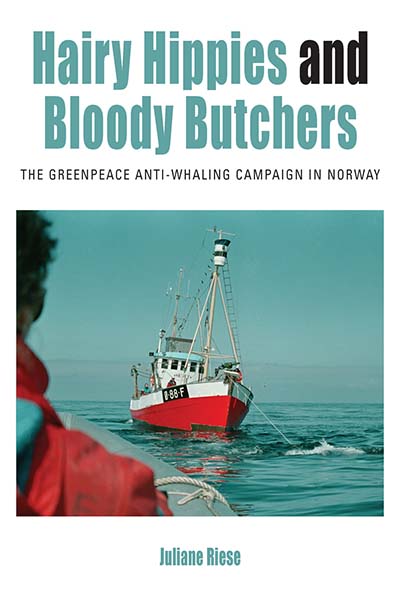
Series
Volume 21
Protest, Culture & Society
Email Newsletters
Sign up for our email newsletters to get customized updates on new Berghahn publications.
Hairy Hippies and Bloody Butchers
The Greenpeace Anti-Whaling Campaign in Norway
Juliane Riese
202 pages, 15 illus., bibliog., index
ISBN 978-1-78533-528-0 $135.00/£104.00 / Hb / Published (May 2017)
eISBN 978-1-78533-529-7 eBook
Reviews
"As a wealthy western democracy with strong green credentials in many areas, Norway would appear to offer a receptive environment for Greenpeace. However, the country's pro-whaling policy has created an antagonistic relationship with the global NGO, forcing it to develop a different set of tactics and strategies in Norway compared to similar countries such as Sweden and the Netherlands. Juliane Riese expertly analyzes this complicated relationship and Greenpeace's efforts to replicate its global anti-whaling campaign in a nation with a strong commitment to whaling. Her rich sociological insights derived from systems theory and Gregory Bateson's double-bind concept, combined with her first-hand experience with Greenpeace Norway, offer us a nuanced and compelling understanding of Greenpeace's efforts to succeed in an antagonistic cultural and political environment." · Frank Zelko, University of Vermont
“Hairy Hippies and Bloody Butchers describes with deep insight the Greenpeace campaign against whaling in Norway. The author manages to give an intimate account of her subject while keeping the analytical perspective of a scholar. By applying Luhmann’s systems theory, she brings a new approach to the study of activism. Her book is essential reading for those who want to understand how Greenpeace campaigns, and for those who want to improve their own campaigning skills.” · Gerd Leipold, former Executive Director, Greenpeace International
Description
In the popular imagination, no issue has been more closely linked with the environmental group Greenpeace than whaling. Opposition to commercial whaling has inspired many of the organization’s most dramatic and high-profile “direct actions”—as well as some of its most notable failures. This book provides an inside look at one such instance: Greenpeace’s decades-long campaign against the Norwegian whaling industry. Combining historical narrative with systems-theory analysis, author Juliane Riese shows how the organization’s self-presentation as a David pitted against whale-butchering Goliaths was turned on its head. She recounts how opponents successfully discredited the campaign while Greenpeace struggled with internal disagreements and other organizational challenges, providing valuable lessons for other protest movements.
Juliane Riese is Associate Professor of Business Economics at Østfold University College in Halden, Norway.

